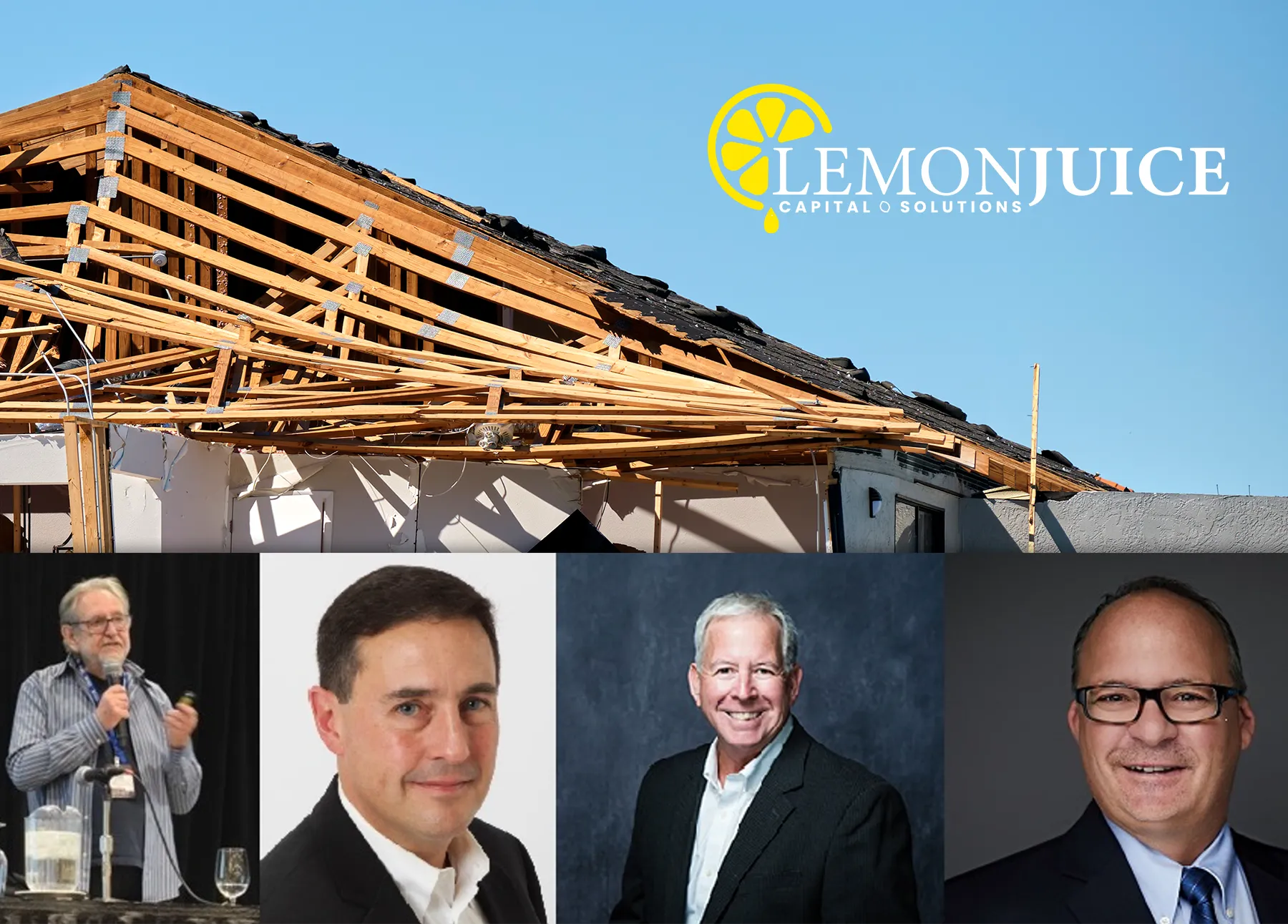A DEEP DIVE PANEL DISCUSSION OF TIMESHARE RESORT MANAGEMENT, INSURANCE, AND TITLE ISSUES AND SOLUTIONS RELATIVE TO HURRICANE DISASTERS
The recent “Hurricane Impacts on Timeshare Resorts Webinar” hosted by the Timeshare Board Members Association (TBMA), featured panelists Scott MacGregor, Executive VP/COO, Lemonjuice Capital and Solutions, Scott McGinness, Vice President, Property & Casualty, Gregory & Appel, and Leon Basye, CEO/President of Global Point Closing Services, as they joined webinar host TBMA president Shep Altshuler for an important discussion on the impacts of hurricanes on timeshare resorts in Florida and other areas, and covering strategic board management options, critical insurance and title issues, and the path to recovery.

Strategic and Contingency Planning
The webinar opened with the panelists commenting on the need for Association Boards to develop strategic plans and solutions to get their timeshare owners back to vacationing following a disaster, along with steps and resources for determining viable insurance options and resolving related title issues.
A Path to Recovery
Big Picture: Determine what’s best for the majority of owners – consider time, the cost and uncertainty of resolving claims, and the necessity for owners to pay maintenance fees during the process.
Scott MacGregor of Lemonjuice Capital and Solutions started the discussion by saying, “We first all have to remember that a timeshare resort is a community of owners. It’s about determining the best possible outcome for the vast majority of the owners that are part of that community by recognizing the situation of each property. There are costs for resolving the issues. For example, the various professional or legal fees that may be consumed, or the cost of materials for repairing or rebuilding − all these things need to be taken into consideration while you’re deciding what outcome we’re trying to achieve for the owners.”
MacGregor also noted that owners will be obligated to pay maintenance fees during the process and most likely not have any opportunity to use the product during that time and that the end goal is to find the best possible options for the owners of these timeshare resorts.
Scott McGinness of Gregory & Appel Insurance talked about the difficulty of resolving insurance claims, as insurance carriers are “notoriously slow, difficult to deal with, and it can be grueling going through the whole claim process” and making sure your insurance agent is an advocate for your resort.
Leon Basye of Global Point Closing Services recommended that when dealing with the timeshare regime or condominium association, “No matter what decisions are made, somebody needs to consider bringing owners together to communicate resolutions” regarding insurance claims and title issues that “can be overwhelming for any board.”
Categories of resorts affected by extreme weather events
Categories of resorts affected by extreme weather events
- Severely damaged but not rebuilding
- Severely damaged with intent to rebuild
- Damaged but planning to reopen
The webinar addressed categorizing resorts affected by the storms, and the planning needed to determine the next steps based on the level of damage incurred and the resorts rebuilding and reopening plans. MacGregor emphasized the importance of starting on title search as quickly as possible, to which Basye commented that “the legal and the title roles can help mitigate some of the bad players” in the Florida marketplace.
In discussing the risk side of the equation, McGinness offered information on possible insurance scenarios, stating “When they’re severely damaged, but not rebuilding, there is usually a provision in every property policy that gives the insured the right not to rebuild. But there is a repercussion on the other end. Normally, that property is going to be insured on a replacement cost basis, meaning the insurance carrier will pay them what it costs to replace that policy up to the policy limit. If they choose not to rebuild, then coverage reverts to actual cash value, which is the depreciated amount, and then they get that check, and they can walk away.
There are different ways of handling a severely damaged building. And if they choose to rebuild, they get replacement costs. If they choose not to rebuild, they get actual cash value, which is going to be a lesser amount.”
Complicating Factors
Complicating Factors
Proceeds and processes for rebuilding, repurposing, or terminating
The next segment of the webinar focused on the potential need for special assessments if insurance proceeds are inadequate, the scarcity of materials and labor delaying construction, municipality considerations, and governance & title issues.
MacGregor said, “Even if the property is adequately insured on paper, in the time it takes to settle that claim, the net amount that the association receives may be substantially inadequate to do what was set out. The owners will be the ones that will be obligated to come up with the funds. In addition to supply chain and labor shortages that we’re already experiencing, there’s a huge demand for materials. And you just may find that your timing is dramatically affected by the shortage of materials and labor.”
“Some municipalities are considering rezoning areas and reexamining the density especially if the building was substantially damaged and has to be rebuilt. Many municipalities are reconsidering what may be rebuildable. And that may have an impact certainly on the value and use of the land or even in the rebuilding process and then whatever path is chosen.
There are the governance issues of making sure that both state law and the governing documents are followed. And then the title issues as we referred to here, earlier in talking with Leon, all those things need to be taken into consideration for terminating the timeshare’s regime. It may even prove to be an opportunity to restructure and do some cleanup now, even if you plan to continue on. These are the types of difficult issues that need to be considered in any sort of strategic plan, to satisfy the majority of the owners.” MacGregor concluded.
According to Scott McGinness, “It’s not uncommon to find that insurance proceeds can be inadequate. Let’s say you have an older building, and it needs to be rebuilt to current codes, and the cost of that is not reflected in the replacement cost. So, you’re automatically in the hole there and don’t have enough funds to build back that building as it needs to be built.”
McGinness also talked about a coverage for replacement costs called Ordinance or Law which can cover part of the cost to upgrade to modern codes, and that, under the normal insurance contract, a teardown is not going to be covered, but could be under the Ordinance or Law coverage, and help with an inadequate proceeds situation.
Critical Steps: Title Search and Ownership Communication
Critical Steps: Title Search and Ownership Communication
Next, Basye discussed properties that may be considering restructuring, reorganizing, or reimagining their resort, and that title search should immediately come into play, along with communicating options to timeshare owners. “We coordinate with associations to meet the needs to gather all the titles and ownership together.
There could be an opportunity to restructure the property if they’re to terminate, or a partition of some sort depending on what’s left. Perhaps they may keep half of it a timeshare, and sell the other half for some other purpose, such as wholly-owned condos. A title company will facilitate the termination process by helping to get all the ownership together, and deal with the closing and the distribution of funds that are due to them.”
Hurricane Damage Insurance Issues
Hurricane Damage Insurance Issues
In discussing insurance issues related to hurricane-damaged properties, McGinness said, “It really starts with the structuring of the policy at the very beginning. There are multiple definitions of both flood and wind damage, and it all must match what your needs are. So, if somebody says you have flood insurance, that may mean backup of sewers and drains, it may not mean storm surge, it may not mean wind driven rain.
You really must be careful in analyzing the policy to begin with. You may not be able to get it all in one source. A lot of resort properties will purchase flood from the National Flood Insurance Program. But there are limitations to that, too. You don’t get any kind of business interruption coverage under the National Flood program. And then there are restrictions of coverage there as well.
You may not be able to get a high enough limit. But then you can explore private flood markets. There are private insurance markets for buying excess coverage. Structuring the policy is the first thing you have to do to protect yourself. Then, at the time of a claim, you do need to work. And your agent should work as your advocate, and they should initially help you prepare the claim submission.”
McGinness also discussed coverages, carriers, and the importance of documentation, as well as the advocacy of your agent being essential. “It’s a lot of work to stay up to speed and get that claim submitted properly and stay on top of it to get it paid.”
Complex and Critical Hurricane Issues
Complex and Critical Hurricane Issues
Altshuler advised that the content of the webinar was not to be considered as providing legal advice. All resorts should act on the advice of legal counsel and professional advisors, as well as staying in compliance with governing documents and state statutes. Of utmost importance, in a time of crisis, contingency planning and safety protocols are a must.

Critical Steps: Title Search and Ownership Communication
Critical Steps: Title Search and Ownership Communication
View the Recorded Webinar Session
To register to view the full TBMA “Hurricane Impacts on Timeshare Resorts Webinar” Zoom video click on this Zoom link: TBMA Zoom On Demand – Hurricane Impacts on Timeshare Resorts Webinar.
As a non-profit organization since 2011, TBMA, in partnership with industry sponsors, continues to advance a mission of supporting those charged with the responsibility of governing and managing their timeshare resorts. TBMA provides education, networking, resources, and solutions, and serves as a bridge between association members and industry professionals, by helping to meet the challenges of the rapidly evolving vacation ownership industry and providing free events, on-demand webinars, e-newsletters, and resort resource information.
For more information, visit TBMA online at tbmassoc.org or via email to staff@tbmassoc.org.
Timeshare Board Members Association,140 County Road, Suite 114, Tenafly, NJ 07670
For more information from the webinar panelists, contact via email to: Shep Altshuler, President, TBMA, shep@tbmassoc.org, Scott MacGregor, Executive VP/COO, Lemonjuice Capital and Solutions, Scott.Macgregor@lemonjuice.biz, Scott McGinness, Vice President, Property & Casualty, Gregory & Appel Insurance, SMcGinness@gregoryappel.com, and Leon Basye, CEO/President, Global Point Closing Services, lbasye@gpcsinc.com
